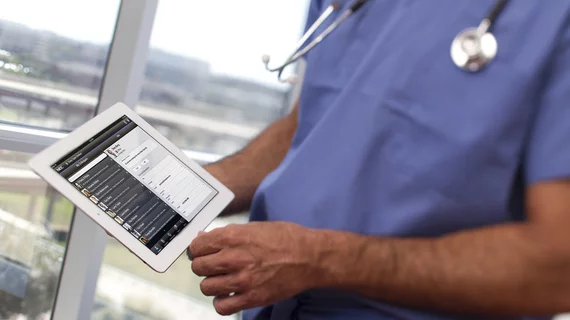Improved radiology reports, clinician education improve knee MRI utilization
Researchers have found that standardized radiology reports and clinician education can reduce unnecessary knee MRI utilization for patients with severe osteoarthritis (OA). The team shared these findings in a new case study published by the Journal of the American College of Radiology.
“The use of MRI has increased worldwide during the past couple of decades for many reasons,” wrote Kelly Tornow, MD, department of radiology at UT Southwestern Medical Center in Dallas, Texas. “Increased availability of MRI scanners is a pivotal contributing factor. The United States has three times the MRI machines per capita than comparable countries on average. One essential preventable factor contributing to the growth in the number of MRI studies is the unnecessary use of imaging in clinical scenarios in which the imaging examination is unlikely to add information that would affect meaningful patient management.”
The specific issue Tornow et al. wanted to explore was excessive MRI utilization for patients with severe knee OA. MRI scans are not recommended by the American College of Radiology (ACR) or European League Against Rheumatism for initially evaluating a patient with knee pain—x-rays are the go-to recommendation in this case—yet the authors noted many patients with degenerative changes still end up being sent in to receive such a scan, even when there is already an x-ray that shows evidence of everything that needs to be seen. This practice is unnecessary, the authors explained, and can delay care for other patients.
Tornow and colleagues began by exploring data from 292 consecutive knee MRI scans performed in the first half of 2017. A musculoskeletal (MSK) imaging fellow assessed the reports from those scans to see if “severe degenerative changes, defined as high-grade or full-thickness cartilage loss on both sides of the joint over an area of at least 1 cm or more,” were present.
A fellowship-trained MSK radiology attending physician also reviewed 20% of the examinations to ensure there were no issues related to quality control. Another MSK radiologist, blinded to the MRI results, was brought in to assess the patients’ corresponding knee x-rays. A KL grading system was used to score the degree of each patients’ OA.
In August 2017, the researchers implemented new structured reporting templates for knee x-rays that included KL grading. Applicable follow-up recommendations were automatically added to the report when the patients had a KL grade of III or IV, a response to the fact that clinicians often used knee MRI scans “for further assessment” in that situation, even though that is not recommended. The authors also saw that clinicians were educated about this issue, using a PowerPoint presentation to drive the point home that this problem exists and needs to be addressed.
MRI utilization was then tracked from October 2017 to February 2018, and the authors observed that more and more knee MRI scans had corresponding KL scores as time went on. Also, the percentage of knee MRIs with severe degenerative changes documented on x-rays dropped from 55% before implementation to 30% following implementation.
“To conclude, implementation of a standardized reporting template for knee x-rays with autopopulated KL grading and focused clinician education are effective ways to decrease the rate of unnecessary MRIs for patients with moderate to severe degenerative changes,” the authors wrote. “This substantial reduction of overutilization of advanced imaging emphasizes the need for a medical decision tool to assist ordering physicians with automated best practice alerts.”

